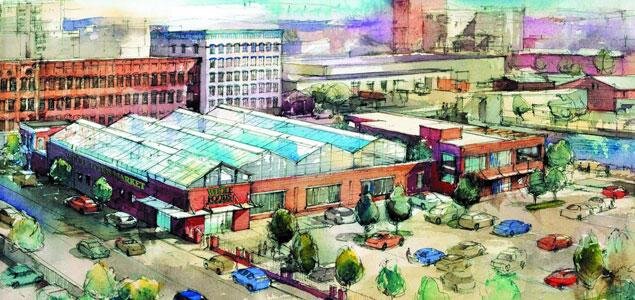Growing Berries on Rooftops in Phoenix? It Could Happen!
Are you alarmed by the news of farmland being lost to development in Central Arizona? And are you inspired by technology as a solution to address climate change and meet the needs of our growing population?
If so, then you’ll want to meet Dr. Anthony Kamson: a Phoenix resident working to use innovation, technology, and knowledge of our local food systems to find solutions to our most pressing challenges.
He’s starting a new cooperative to expand and diversify the ways we can feed our growing communities good food. Dr. Kamson has written the following information to help you meet AZUBC: the Arizona United Berries Cooperative!
Guest Post by Dr. Anthony Kamson
Arizona Center of Expertise and Partnership on Sustainable Local Food Systems
Arizona United Berries Cooperative (AZUBC) is a multi-stakeholder cooperative promoting and supporting technology-based commercial small-scale family farming in Arizona. To substantially improve the local food development movement, AZUBC is introducing the innovation of using controlled environment greenhouses on the rooftops of buildings to grow berries.
Rooftop farming has been postulated as one of the best solutions for improving local food production in cities. A big perk of rooftop farming is that it overcomes a major challenge: that urban land is extremely attractive, and valued extremely high, for development and housing purposes. This trend is no exception for urban areas like Maricopa County, where history clearly demonstrates that as the population increases, development is given priority over farming. Rooftop farming in controlled greenhouses allows for a diverse use of the land, as well as increased yields in crop production. It enables families and entrepreneurs alike to more easily access to the opportunity to generate supplemental food and income.
But of course, the benefits of higher yields with controlled environment greenhouse is counterbalanced by the high startup and operations cost, as well as the specific level of knowledge required to operate and manage a technology-based farm on a commercial basis.
Growing the Idea
AZUBC, as proof of concept, is conducting a pilot project to by establishing a community-centered greenhouse on a parking deck or commercial building to grow strawberries.
The initiative is intended to metamorphosize into a nonprofit entity and seek partners organizations. The facility will offer learning and hands-on opportunities for members of AZUBC as well as community members with a focus on youth and people experiencing homelessness, at no cost to them. The facility also will enable policymakers and planners to have a better understanding of the issues involved by encouraging greater participation in local food development as an economic activity that generates jobs and adds income to the community. The initiative for sustainable and resilient local food systems in AZ using community centered greenhouse rooftop farming will support strategy and action planning for more resilient food systems at the local level.
A major effort of the initiative is to promote collaboration among stakeholders in the coming years to address ever increasing challenges of sustainable local food development with emphasis on urban agriculture. The collaboration will contribute to the development of sustainable communities/cities by facilitating program development, action planning and research, capacity development and advisory services, policy design, lobbying and advocacy, knowledge management and sharing on urban agriculture and resilient and equitable local food systems.
The initiative is guided by 3 principles:
Food sovereignty & the universal right to food
Sustainable & resilient cities/communities
Multi-stakeholder engagement
And has 3 strategic goals:
Promote localized systems of production & consumption for more inclusive food systems
Strengthen the resilience of urban food systems
Strengthen the role of cities in food policy governance
Who’s Involved?
Partnership in the collaboration will be opened to those who’s mission or interest is: urban agriculture, city region food systems, sustainable urban development, resource recycling, climate change adaptation and disaster risk reduction, food security and sovereignty, poverty alleviation, social inclusion and citizen engagement in policy making, local economic development, improved urban environment management and landscape management. The partnership will be made up of cities, educational institutions, and civil service organizations. Partners are expected to contribute technical and policy expertise with practical knowledge.
Acting as a food policy/food systems think-tank oriented towards the delivery of practical and high-quality results in action, research and planning projects, applying a demand-driven and participatory approach while remaining flexible and providing room for change and innovation, the impact of the initiative will be evidenced by the enhanced capacities of local authorities and other stakeholders and the facilitation of the integration of urban agriculture and city-region food measures in policies and action programs of local governments, civil society organizations and private enterprises, with the active involvement of the urban producers and elevant stakeholders.
Next Steps: Building the Team
AZUBC seeks to establish a nine-member Advisory Board for the initiative and cordially invites professionals in horticulture, agriculture, law, arts, marketing, accounting, construction, youth, business development, and grants administration to consider serving on the Advisory Board. Interest and resume can be sent to Dr. Anthony Kamson at info@azubc.coop
Those who are interested in serving as volunteers in the project can sign up below!
About Dr. Anthony Kamson
Dr. Anthony D. Kamson is a social entrepreneur and visionary. His academic background is in Communication and Education from Kent State University, Michigan State University, and Boston University. His working experience includes positions in management, research and training, as well as ownership of a consulting firm. Current efforts as a registered investment representative involves an initiative for a more inclusive and equitable financing system for sustainable and 21st century lifestyles for middle market rural communities, worldwide.




